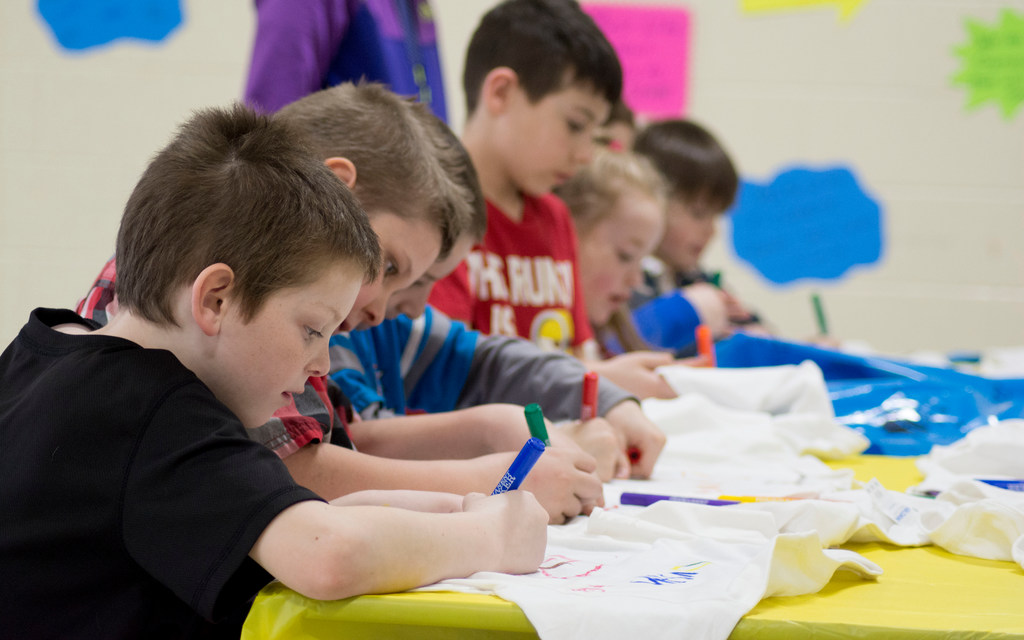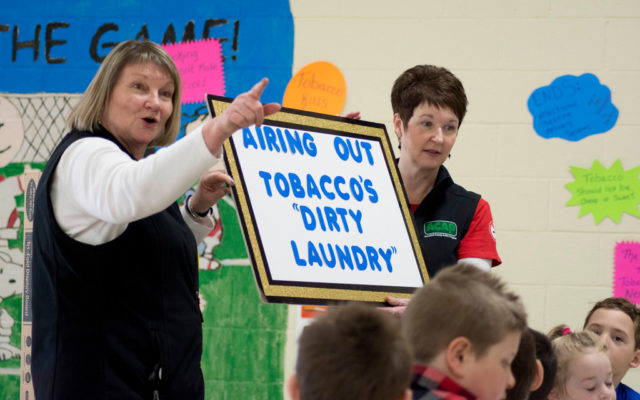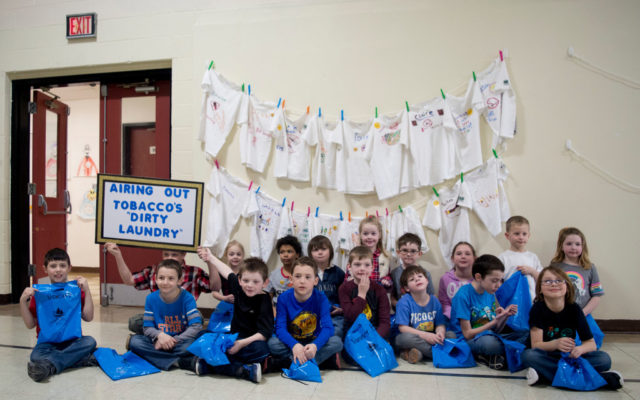
CASWELL, Maine — Students at Dawn F. Barnes Elementary School in Caswell made a pledge to never start smoking cigarettes or use electronic nicotine products during national “Kick Butts Day” on March 20.
The Campaign For Tobacco-Free Kids, a non-profit advocacy group, organizes “Kick Butts Day” events across the country. On Wednesday, two community educators with the Aroostook County Action Program made a presentation at the Caswell school to teach the 5-7 year olds about the dangers of tobacco. The event began with the students signing a “pledge” to never begin smoking, and continued with them learning about the hazards of nicotine products.
The children also created their own T-shirts with slogans and images about tobacco dangers and hung them up on a wall in the school’s multi-purpose room. ACAP educators told the students that hangint the T-shirts represented “airing out tobacco’s dirty laundry.”
Principal Krystina Davenport said that this was the first time the school hosted such an event, and that she absolutely would consider hosting ACAP representatives again.
ACAP Community Educator Jo-Ellen Kelley said “Kick Butts Day” is “really about youth activism,” and empowering the new generation to become “the first generation of non-smokers.”
“They will learn about the hazards of smoking,” Kelley said, “particularly with Juul and e-cigarettes. Cigarette use has been declining every year, but vaping has actually increased this year for the first time.”
She said this increase is “absolutely” occurring in schools across the country.

Dawn F. Barnes Elementary School students sign their names on a large sheet of paper, pledging to never begin smoking. (CHris Bouchard)
“It happens more in high school,” Kelley said, “but we actually see it begin in some middle schools. It depends on a lot of environmental factors, so we try to do everything we can to reduce usage, including advocating for flavored e-cigarettes to be taken out of convenience stores. Now, they can only be sold in a store where only customers over the age of 21 can enter.”
She said you “can’t start young enough” in encouraging children not to smoke, especially since many e-cigarette manufacturers are targeting their marketing at youngsters.
Tobacco Prevention Coordinator Dawn Roberts explained to the students that, one day, they will become teachers, presidents, and educators, and she asked them what will happen if they start to smoke.
“You’ll get cancer,” said one student.
“That’s right,” said Roberts, “and it will get harder to breathe. If your lungs weren’t healthy, how could you run in place?”
She asked the students to run in place, a request they excitedly accepted.
Roberts then mentioned the dangers of vaping, which she said can “rot out your teeth.”
She said the best way to quit smoking is to never start. One young student added that “if you do smoke and it starts to make [you feel] bad, you can try the gum and then you can quit.”
At one point, Kelley and Roberts brought out plain white T-shirts and materials for the students to decorate them with a non-smoking message, as the instructors explained the “dirty laundry” concept.
“‘Dirty laundry’ is all the things they tell you about smoking,” said Kelley. “Now you know better, and that smoking can cause cancer, bad teeth, and unhealthy lungs.”
With the T-shirts hung up on the wall, Roberts asked the students to run from one wall to the other to show off their healthy lungs. Students again took on the task with excitement.
“What do these T-shirts tell us?” Roberts asked the group. “That you’re going to be the generation that ends smoking. Is anyone here ever going to smoke?”
“No!” students shouted in unison.
- ACAP Community Educators Jo-Ellen Kelley, left, and Dawn Roberts explain the concept of airing out tobacco’s dirty laundry during a March 20 anti-smoking event at Dawn F. Barnes Elementary School in Caswell. (Chris Bouchard)
- Caswell students sit in front of anti-smoking T-shirts they created to “air out tobacco’s dirty laundry” during a March 20 event at Dawn F. Barnes Elementary School. Pictured in the back, from left, are Garett Achorn, Nathalie Thompson, Jailyn Danskin, Aidan Withey, Emma Sandstrom, Isaac Goodwin, Claire Brissette, Owen Anderson, and Rylee Labreck. Front row, from left, are Dawson Berentes, Rickey Roussel, Dustin Giggey, Tanner Peers, Tanner Brooker, Ethan Johndro, Parker Bosse, and Isaac Brissette. (Chris Bouchard)









